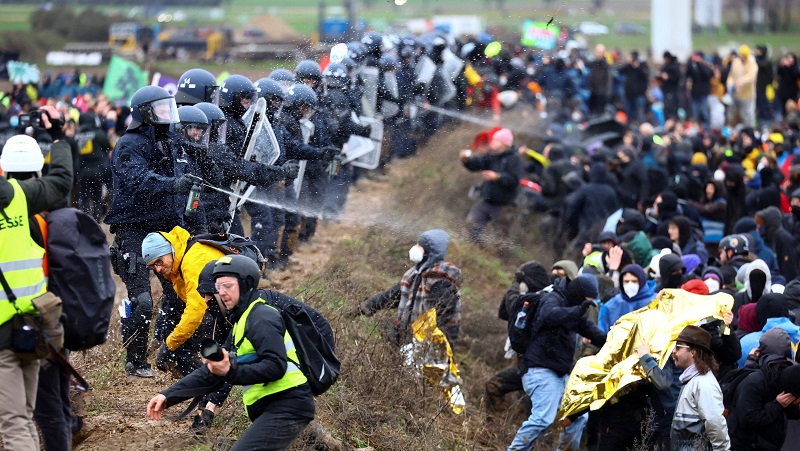Around 6,000 protesters – including climate activist Greta Thunberg – marched through mud and rain to the German village of Luetzerath on Saturday, according to a police estimate, demonstrating against the expansion of an opencast lignite mine.
The clearing of the village in the western state of North Rhine-Westphalia was agreed between RWE and the government in a deal that allowed the energy giant to demolish Lutzerath in exchange for its faster exit from coal and saving five villages originally slated for destruction.
“This is a betrayal of present and fuure generations… Germany is one of the biggest polluters in the world and needs to be held accountable,” Thunberg said on a podium, after she marched with a cardboard sign saying in German “Luetzi stays”, using a shortened name of the village.

Climate activist Greta Thunberg takes part in a protest against the expansion of Germany’s utility RWE’s Garzweiler open-cast lignite mine to Luetzerath, in Keyenberg, Germany, January 14, 2023. REUTERS/Christian Mang
As the protesters neared the village, they were confronted by police in riot gear, and some used batons to push the protesters back.
Regional police said on Twitter it had used force to stop people from breaking through barriers and nearing the danger zone at the edge of the excavation area.
Earlier this week, police cleared out protesters from buildings they have occupied for almost two years in attempt to stop the nearby mine’s expansion.
On Saturday, only a few remained camping out in treehouses and an underground tunnel, but thousands turned up to protest against the mine, which activists say symbolises Berlin’s failing climate policy.

Police officers scuffle with activists during a protest against the expansion of Germany’s utility RWE’s Garzweiler open-cast lignite mine to Luetzerath, Germany, January 14, 2023. REUTERS/Christian Mang
Dozens of climate activists in Uganda’s capital city Kampala protested against the mine. “No more coal,” said one placard. “Not in Uganda. Not in Germany. Not anywhere”.
The president of North Rhine-Westphalia Hendrik Wüst told German radio Deutschlandfunk on Saturday that energy politics was “not always pretty” but that the coal was needed more than ever in light of the energy crisis confronting Europe’s biggest economy.
Earlier, economy Minister Robert Habeck told Spiegel on Friday that Lutzerath was the “wrong symbol” to protest against.
“It is the last place where brown coal will be mined – not a symbol for more-of-the-same, but for the final frontier.”

Germany has phased out coal production slower than other European countries (Photo: Our World in Data/ Screenshot)
But activists have said Germany should not be mining any more lignite and focus on expanding renewable energy instead.
Germany plans to stop using coal for electricity by 2030 and to become carbon-neutral by 2045, one of the earliest dates in the world.
